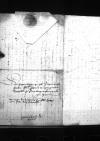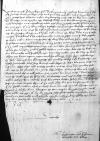 BCz, 1598, p. 191
BCz, 1598, p. 191
Hochwirdiger ihn God Furst, gnediger herre /.
Unsere gannz willige ungesparthe dienste somith E(were) F(urstlichen) G(naden) stetes zuvorahn bereith. /
Gnediger Furst unnd Herre. /
Wihr ubersenden nach E(wer) F(urstlichen) G(naden) gnedigem begeren hir beigelegthe abcopeien unserer beandworthunge, welche wihr vor drey iaren auff des romischen reichs exaction ahn ⌊kaiserliche ma(iestä)th⌋ unnd das ⌊kammergerichte⌋ gethaenn / unnd dieselbigen unns ungeoffeneth widerumb seinth zugeschiketh worden etc. Unnd bedanken unns gegen E(were) F(urstlichen) G(naden) des gnedigen trostlichen rats so vo(r)mergen derselbigen anforderunge und ladunge E(were) F(urstlichen) G(naden) iungst bey unserm secretario unns haben verstendigen lassen, / welchen wihr den zuvolgen ms. zuvelgen(!)
⌈zuvolgenzuvolgen ms. zuvelgen(!)
⌉ bedacht / unnd diesen unsern diener ahn ⌊konig(liche) ma(iestä)th⌋, u(nseren) a(ller)g(nädigsten) h(errn), abgevertigeth / unnd dweill E(wer) F(urstlichen) G(naden) auch sonst gnedige vertrostunge gethan / unns ihn disen geschefften bey diesem unserm diener mith schrifften bey konig(licher) ma(iestä)th forderlich zu sein. /
Haben wihr denselbigenn erstlich auff ⌊Heilsburg⌋ zu E(werer) F(urstliche) G(naden) zu reithen bevolen / gantz dienstlich bithende E(wer) F(urstliche) G(naden) wollen nach gnediger vertrostunge ⌊unser stad⌋ besten frommen sowoll bey ⌊konig(licher) ma(iestä)th⌋ als des hern ⌊canzlers⌋ gnaden helffen vorderen unnd erbithen, / das wihr bey diesem unserm diener widerum(m)b schrifftlich moegen verstendigeth werden. / Was ⌊koe(nigliche) ma(iestä)th⌋ ihn diesem obligenn vor dreien iahrenn gethan / unnd zur ablenunge dieser izigen anforderunge bey ⌊keyser(licher) ma(iestä)th⌋ und dem ⌊kamergerichte⌋ thun werde / etc.
Auch ist unser dinstlich bithen gnediglich zu vermerken, das ⌊Joerg Gelewalth⌋, unser bürger, ihn sachen der armen leuthe vom Schonmor / seyner written over ...⌈... illegible⌈...... illegible⌉ seyner seyner written over ...⌉ sachen alhie verlustig gworden / und ahn ⌊konig(licher) ma(iestä)th⌋ appellierth habe, / aber wihe ehr die sportulas ms. spertulas(!)
⌈sportulassportulas ms. spertulas(!)
⌉ dem gerichte solche abelegen / forderth ehr keine Acta unnd Apostolos unnd leth es also stecken / zum nachteill der armen leuthe / unnd besorgen / unns, ehr werde ethwa bey ⌊konig(licher) m(aiestä)th⌋ sich bearbeithen und nach linkischer berichtunge ⌊unserer stad⌋ gerichtenn nachteilig / unnd den armen leuthen schedlich sein. / Welchs zu verhuthen ist unnser dinstlich bithen, / E(wer) F(urstlichen) G(naden) wollen solchs des hern ⌊canzlers⌋ gnaden ihn E(wer) F(urstlichen) G(naden) schrifften meldenn / unnd gnediglich darob sein, / wohe ehr und ⌊Schrother⌋, unser widerparth zu ⌊Krakaw⌋, kemen, / das ihnen ihn ihrem vorgeben kein glaub gegeben werde. / Das wollen wihr gegen E(wer) F(urstlichen) G(naden), die wihr Gothe lange gsunth empfehlen mith bsondern ernste zu vordienen stetes willig unnd geflissen erfunden werden.


 BCz, 1598, p. 192
BCz, 1598, p. 192